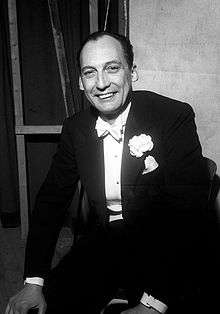Alberto Semprini
Alberto Fernando Riccardo Semprini (27 March 1908 – 19 January 1990) known by his stage name Alberto Semprini, or Semprini, was an English pianist, composer and conductor, known for his appearances on the BBC, mainly on radio.[1]
Alberto Semprini | |
|---|---|
 Alberto Semprini in 1954 | |
| Background information | |
| Birth name | Alberto Fernando Riccardo Semprini |
| Born | 27 March 1908 Bath, Somerset, England |
| Died | 19 January 1990 (aged 81) Brixham, Devon, England |
| Genres | Classical |
| Occupation(s) | Musician, composer, conductor |
| Instruments | piano |
Biography
Born in Bath, Somerset, England, of Italian ancestry, Semprini showed early talent for both the piano and cello. He graduated from the Verdi Conservatory in Milan in 1928, having studied composition and conducting as well as honing his skills at the piano. In Italy he performed a broad range of music, from pop to jazz and classical, and in 1938 led his first radio orchestra in Italy. In the late 1950s he also featured regularly at the San Remo Festival.
Back in the UK, he hosted a light music programme, Semprini Serenade, which he introduced with the words: "Old ones, new ones, loved ones, neglected ones". The program first aired on BBC Radio in 1957 and continued for around 25 years.[2] Although his 'house band' was the New Abbey Light Symphony Orchestra on his commercial records, on radio he was always accompanied by one of the BBC's own staff orchestras – initially the BBC Revue Orchestra.
Semprini also wrote a number of original light music compositions, including Concerto Appassionato and Mediterranean Concerto, which he used as the theme tune for his radio show.
Recordings
Semprini was a prolific recording artist. His work was first released on the Italian label Fonit Cetra, then EMI Records, where he remained for the rest of his professional career. Although strongly associated with light music, his recordings were principally of well-known classical music, including the Grieg Piano Concerto and solo pieces by Beethoven, Chopin, Liszt, Tchaikovsky and Debussy.[3]
In 2015 Vocalion Records released a CD of his late 1950s broadcasts with the BBC Revue Orchestra, most of which had not been heard since their first broadcast.
Popular reference
In the Monty Python's Flying Circus segment known as "The Chemist Sketch", the BBC interrupted the show to ban a number of "naughty" words, including "b*m", "b*tty", "kn*ckers", "kn*ckers", "p*x" and "w**-w**"[4] The final prohibited word, a puzzling and random addition to the list, was "Semprini". Immediately when the action resumed, the chemist (John Cleese) asked, "Who's got a boil on his Semprini, then?" and was quickly taken away by a policeman (Graham Chapman). For the rest of the episode, anyone saying "Semprini" was similarly arrested.[5]
References
- "Semprini, (Fernando Riccardo) Alberto". Oxford Dictionary of National Biography. Oxford University Press. 2004. doi:10.1093/ref:odnb/40662.
- "Music Programmes: Semprini Serenade". Radio Days. Whirligig. Retrieved 4 July 2009.
- "Alberto Semprini". Discogs.com. Discogs. Retrieved 26 January 2019.
- "Monty Python Semprini Sketch". YouTube. Retrieved 4 August 2020.
- "Chemist Sketch/Words Not to be Used Again". MontyPython.net. 2014. Retrieved 26 January 2019.